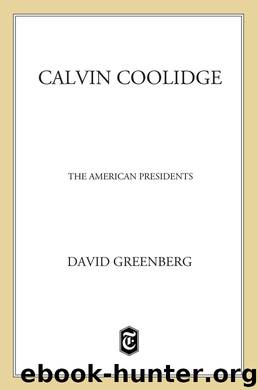Calvin Coolidge by David Greenberg

Author:David Greenberg
Language: eng
Format: epub
Publisher: Henry Holt and Co.
Published: 2012-05-30T16:00:00+00:00
Ironically, publicity innovations may not have been necessary to reelect Coolidge. With labor radicalism diminishing, business improving, and even farmers enjoying a brief uptick in their incomes, Coolidge could stick to the kind of ground game that suited his temperament. “If you keep as much as you can to an expression of general principles, rather than attempting to go into particular details of legislation,” he advised Dawes, who was stumping for the ticket, “you will save yourself from a great deal of annoying criticism.” (He added: “P.S. Whenever you go anywhere, take Mrs. Dawes along.”) The absence of a record of legislative achievement like Wilson’s or of executive dynamism like Roosevelt’s seemed to bother relatively few voters. The $4.3 million Republican Party war chest, which dwarfed the Democrats’ $820,000, didn’t hurt either.26
La Follette’s presence in the race, moreover, helped Coolidge substantially. The Republicans attacked the Wisconsin Progressive more than they did the hapless Davis. Since the Red Scare of 1919 and 1920, fear of Bolshevism had cooled considerably, and Coolidge had even softened the hard line against recognizing the Communist regime in Russia. But assailing La Follette’s radicalism, even to the point of fearmongering, proved irresistible. “Whether America will allow itself to be degraded into a communistic or socialistic state, or whether it will remain American,” said the president, loomed as the signal issue in the campaign. “Coolidge or Chaos” became the Republicans’ rallying cry, with the sober, even-keeled president offering himself as a rock of stability in changing times. Oswald Garrison Villard, the editor of the Nation, explained that Americans seemed to feel that Coolidge “is just what the country needs, a quiet, simple, unobtrusive man, with no isms and no desire for any reform.” Coolidge even managed to rally to his side a number of prominent liberals. In October, the New Republic ran a debate among its contributors over whom to vote for. While the liberal thinkers Herbert Croly and Felix Frankfurter backed La Follette and Walter Lippmann came out for Davis, Chester Rowell, a longtime progressive, maintained that he and other onetime Theodore Roosevelt supporters “are now for Coolidge” because of their “confidence in his personal independence of reactionary influence.”27
Coolidge had done an exceptional job of mastering the new methods of politics in a mass society. Just as in his statements on the veterans’ bonus and tax cuts he had invoked his belief in a common good that trumped minority interests, so in his campaigning he had held himself out as a tribune of the American people writ large. To his loyal aide Bascom Slemp, the appeal to the majority was undeniable. “From his lips fell his declaration of policy, drawled in the tang of Vermont, with no grace of delivery or art of oratory, but so profound and true that it captured and held the minds of men,” he wrote. “In eighteen months he had a unanimity of following in the country rare in our political history.” More objectively, Kenneth Roberts of the Saturday Evening Post
Download
This site does not store any files on its server. We only index and link to content provided by other sites. Please contact the content providers to delete copyright contents if any and email us, we'll remove relevant links or contents immediately.
| American Revolution | Civil War |
| US Presidents |
Fanny Burney by Claire Harman(25778)
Empire of the Sikhs by Patwant Singh(22163)
Out of India by Michael Foss(16309)
Leonardo da Vinci by Walter Isaacson(11894)
Small Great Things by Jodi Picoult(6085)
The Six Wives Of Henry VIII (WOMEN IN HISTORY) by Fraser Antonia(4784)
The Wind in My Hair by Masih Alinejad(4420)
The Lonely City by Olivia Laing(4112)
The Crown by Robert Lacey(4098)
A Higher Loyalty: Truth, Lies, and Leadership by James Comey(4024)
The Iron Duke by The Iron Duke(3635)
Millionaire: The Philanderer, Gambler, and Duelist Who Invented Modern Finance by Janet Gleeson(3565)
Sticky Fingers by Joe Hagan(3449)
Alive: The Story of the Andes Survivors by Piers Paul Read(3302)
Papillon (English) by Henri Charrière(3263)
Joan of Arc by Mary Gordon(3253)
Stalin by Stephen Kotkin(3081)
Aleister Crowley: The Biography by Tobias Churton(3015)
Ants Among Elephants by Sujatha Gidla(2920)
